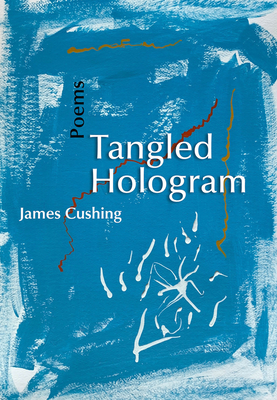James Cushing
Cahuenga Press ($20)
by Lee Rossi
In his latest volume of poetry, enticingly titled Tangled Hologram, James Cushing sees distress all around, but he offers his readers an alternative—not nihilism, but its sunnier cousin, anti-nihilism.
Like Joyce and Ashbery before him, Cushing celebrates the ability of dreams to interrupt our conscious reveries. His images are highly specific; he sees so clearly and yet explains nothing. For example, in “The Maze of Mercy,” he tells how “I tried to find the father-trees / inside my chest and announce them in trousers and shirt.” The search for the father(s) is a recurrent concern. How are we supposed to feel after reading one of his dream poems—satisfied, perplexed, delighted, frustrated? As Cushing cryptically declares:
Let me shape for you a sentence that balances
the sadness you have neglected to sweep up with
an overload of love.
In Tangled Hologram, human relationships operate like logic gates, oscillating between too much and not enough. Cushing also plays with ideas about destiny and expectation. In “Protracted Farewell,” a mini-epic surrealist bildungsroman, he observes:
I have only my story to tell, but it may also be yours, and so
I tell it, again and again. I tell it because we are footfalls
and our path through the world is divided into nature
and falsehood.
Near the beginning of the poem, we find the young speaker hiding behind his parents’ bedroom “where I hear / my parents talking about me as if I weren’t anywhere around.” This sense of exclusion, of adult conspiracy, haunts the poem. Elaborating on this sense of sinister forces shaping his destiny, he declares: “I felt I had been invaded by a shadow-company of slightly / embodied ideals,” which “had been written years / before any of us were born.”
How, then, is one to live authentically? Are we all doomed to live lives mapped out by our family, tribe, and nation? Cushing offers the possibility of finding respite and inspiration in imagination. Consider “Dream of Women,” his canny reworking of Tennyson’s “A Dream of Fair Women” and Chaucer’s “The Legend of Good Women.” According to those earlier poets, beauty brings not happiness but tragedy. Cushing takes a different tack, celebrating all the women who have brought not just beauty but meaning and insight into his life. It is a lengthy and unabashedly humorous list, beginning with Memphis Minnie and Joan Didion and continuing with Marianne Moore, Patricia Highsmith, Bettie Page, and dozens of others before concluding with Sappho, who “takes her Martin acoustic guitar out of its case and starts tuning up.” “Is it right or wrong,” he asks, “to want to live inside this dream as long as I can?” You might have a different answer, but like Cushing I want a dreamscape that includes all these charmers, heartthrobs, and witches.
Cushing is not a strict formalist, but he likes to flirt with form, as he does most charmingly in the two pantoums included in this volume. “Falling Asleep Listening to Billie Holiday,” for instance, offers slapstick desperation:
You’d think I had grown up over the years, gotten past that fear and shame,
but watch me stumble down the stairs of years into my childhood and get up
inside that house—my mother’s perfume, her detergent, her bacon grease.
The speaker’s frustration, his awareness that he had not outgrown his childhood, invites the reader to deconstruct his own precious adulthood.
“For David Trinidad and Tiela Garnett,” the other pantoum, is a wildly erotic re-enactment of the classic film noir, “The Postman Always Rings Twice.” Toward the end of the poem (and the movie) we encounter the following:
A dark pool of doom opens up around Lana and John, an ocean of lust and hate
they run into near the end of the picture, she in her tight white bathing suit.
They killed the old man because they needed a crime to relieve their tension,
and their last kiss leads with insolent ease to her violent death . . .
Not the happiest of romantic endings, but after all this is film noir, the unmarked sedan of middle-class morality. And yet, in its own lurid way, it is also a celebration of passion and youth, aspects of life which emerge from that “dark pool of doom” like the Creature from the Black Lagoon. Of course, the Creature eventually retreats into the swamp, but only until the next time a couple of hot-blooded kids get a whiff of one another.
Cushing’s phantasms are uniquely his own, but we lucky readers can join them in this Tangled Hologram as we seek refuge from the humdrum, the lifeless, the oppressive, and the painful in our day-to-day existence. What a book!
Click here to purchase this book at your local independent bookstore:
Rain Taxi Online Edition Winter 2022-2023 | © Rain Taxi, Inc. 2023


